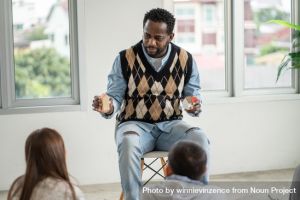I am a huge fan of Ted Lasso and recently came across some leadership lessons from the show circulating on social media. As I tried to determine my focus for writing this blog, many of the ideas I had were in line with Ted’s lessons. This past school year, I decided it was time for a bit of a career change and accepted a leadership position in a neighboring school district. Taking some advice from Ted, I was optimistic a new opportunity would be good for me! As I embarked on my new role, I took some time to reflect on what went well in my previous leadership position and what didn’t. I hope the tips I share below are helpful to you.
Stay Teachable and Never Stop Learning!
As a somewhat younger leader, I love soaking up every leadership lesson I can. Learning about different leadership approaches and styles is something I’ve always enjoyed. It’s important to understand your own leadership style, recognizing your strengths and areas for growth. When you’re in a leadership position, it can be hard to find time for professional development and easy to stay in your own bubble within your district. Making time for training, not only in your specific area of work but also in leadership, is crucial. I am very much a collaborative leader and enjoy working with a team to solve problems; I certainly don’t have all the answers!
“Making time for training, not only in your specific area of work but also in leadership, is crucial.”
Take the Time to Build Relationships and Trust

As someone new to the district, it was crucial for me to get to know all the stakeholders. One of my first tasks was to meet with all school leadership teams, asking them questions to learn more about their schools, student populations, achievements, and areas for growth. I also used this opportunity for school leaders to get to know me and learn about my experience and how I could support their school community. Additionally, I spent time meeting individually with all school counselors and social workers. I had prepared specific questions for them to help me understand their passions and the important work they do in our schools. This helped me get to know each person on an individual level and understand how best to support them.
Be Curious, Not Judgmental
As I considered how I might support and engage with counselors and social workers, I started getting curious and considered the feedback they shared with me in our one-on-one meetings, as well as feedback from other leaders. An identified need was collaboration among schools, as well as direction and leadership from the district level. This led me to create district-level meetings by school level. In creating the agenda and vision for these meetings, I struggled and leaned on some previous training from Restorative Leadership around Fair Process. I began by letting the teams share with me the historical work that has been done in their roles, what work was helpful, and what work felt like it was not helpful. I then used this feedback and input to determine a path for the work we would do as a team. It can be easy to come into a new leadership role and feel like you know what is best or that you have identified the problems that need to be addressed, but gaining feedback from those who have been doing the work is extremely important and not something to be ignored. While it may take more time, it will pay off in the long run to help gain buy-in from the team.
“It can be easy to come into a new leadership role and feel like you know what is best or that you have identified the problems that need to be addressed, but gaining feedback from those who have been doing the work is extremely important and not something to be ignored.”
Patience is a Virtue
When I started my new role, I felt a lot of pressure to pick up where the person before me left off and continue their important work. I am often reminded by my Superintendent this is a marathon, not a sprint. It’s important to remember this work takes a lot of time and effort, and there are no quick fixes in the world of student support. While there are times you’ll feel pressure to make quick decisions or changes, it’s important to remember that slow and steady wins the race! There have been many times when I’ve made quick decisions and reflected back to think, if only I had taken my time I might not have ended up with the resistance or push back I am experiencing now.
Celebrate Wins, Big and Small
It’s important to remember and recognize the wins you have in this role and in the world of student support. One thing I try to be very intentional about is sending messages of gratitude to our staff regularly. I believe that recognition is crucial because the world of student support often goes unrecognized and unappreciated. Simple notes which celebrate wins, let staff know they are seen and appreciated, and that you are rooting for them are really important.
And last, but certainly not least See the Good
As a leader, it can be easy to get bogged down by the demands of the role and the support that staff and students need. I want to remind you it’s important to be a source of positivity and calm for your team. In the face of adversity, Ted Lasso often brings an outlook which can be infectious, and that is something I strive to emulate in each interaction I have with those on my team.
Resources
Please login or register to claim PGPs.
Alternatively, you may use the PGP Request Form if you prefer to not register an account.



